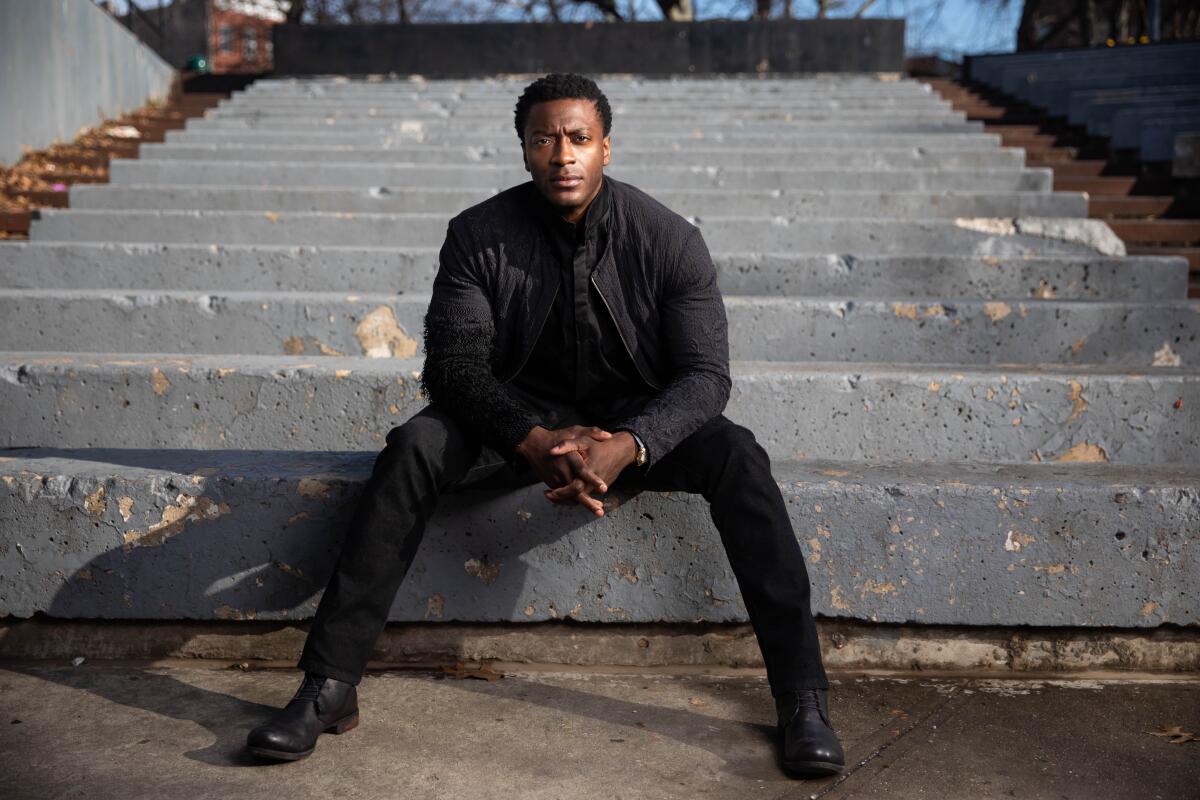A rare portrait of Black men: Aldis Hodge knows the impact of ‘One Night in Miami’

- Share via
When actor Aldis Hodge says, “I sign on to things with the hope of purpose being added to that particular piece of art,” the totality of his signature roles comes into focus: the crusading D.A. on Showtime’s “City on a Hill,” the death row inmate in “Clemency,” the falsely accused athlete Brian Banks. Now comes his commanding portrayal of game-changing football legend Jim Brown in Regina King’s “One Night in Miami,” a what-might-have-been-said scenario based on a real-life gathering of Brown, Malcolm X (Kingsley Ben-Adir), Sam Cooke (Leslie Odom Jr.) and Cassius Clay (Eli Goree) in one hotel room in 1964, the year before Brown’s string of legal issues began.
The potential audience impact of the quartet’s collegial yet pointed hashing out of one another’s ambitions, experiences and sense of responsibility was readily apparent to Hodge, never more so than after last summer’s protests against racial injustice. “There are a lot of people right now who don’t understand how to empathize with the pain of certain people, because they never will have known it,” he said recently. “That’s one of the most powerful elements of this film, that it shows how you understand somebody’s pain.” “One Night in Miami” was released on Amazon Prime last Friday.
One could assume four giants of their time might be sizing each other up in this situation, but the movie feels more complicated than that.
They’re friends. They’re seeking to understand each other. What we typically see from the outside perspective is the idea of comparison, right? Negative debate. When it comes to Black culture, we always have to be fighting, crabs in a barrel. That’s absolutely not what we have here, and that’s what I love. Because in my circles, talking to my people, I know this is how we handle each other. “You got your perspective. Yo, my man, I feel you on that. Let me give you this other thing to consider. Now let’s figure out how we could meet in the middle.” It also gives Black people a moment to breathe, and laugh. Because it’s pretty funny, the way they deal with each other.
Your portrayal of Brown has this quality of patience. He looks ready to be somebody’s big brother as needed.
I felt like for a good portion of this film, he was the adult in the room just watching the children play. That’s by no means out of disrespect. But he’s like, “How do we figure out how to cool things down so everybody can actually listen to one another?”
Is that an element of Brown’s demeanor you gleaned from watching clips of him?
One that I speak of all the time is an interview on “The Dick Cavett Show,” where he’s debating then-Georgia Gov. Lester Maddox. Lester gets so upset that he cannot debate Jim Brown at [Brown’s] intellectual level that he storms offstage mad. There’s so much going on in that particular interview that I love, and to a degree almost hate.
How so?
You see Jim Brown handle himself with so much class, etiquette and polish. At the same time, his eloquence is only there because he is not, in that particular space as a Black man, allowed to get as belligerent as Lester. Otherwise, he [will be] further discredited. This crazy governor is allowed to be unequivocally, unapologetically himself, and Jim can be himself, but he has to out-think the situation, because he has to figure out how he’s perceived. It’s extra homework that we have to do that other people don’t.
In 1964, when this powerhouse foursome met, Brown was beginning to take movie roles, already thinking about life’s next phase. Did you see that as unusual for an athlete at that time?
I looked at him as an outlier, a savant when it came to business. As a Black man, he understood his situation in terms of how the world saw him, but he also knew his potential, so he didn’t allow the world to define that for him. That’s who all these men are in different aspects. Jim Brown understood the power of economics and the potential of that power when truly applied within his community. It’s why he started the Black Economic Union shortly after this.
As for being directed by Regina King, when the person calling the shots is herself a supremely accomplished actor, does that give you added security or added pressure?
There’s a duality. [Laughs.] The pressure is that if you suck, she’s gonna catch it. You better come ready! But also, because of her humility and patience, honestly that pressure was a blip in the night. She made us feel really comfortable about what we wanted to do, how we wanted to do it, and why we wanted to do it. After you get over the image in your head of her grandeur — because, I mean, she is a titan in the game — you realize, I’m here because she chose me to be here.
More to Read
From the Oscars to the Emmys.
Get the Envelope newsletter for exclusive awards season coverage, behind-the-scenes stories from the Envelope podcast and columnist Glenn Whipp’s must-read analysis.
You may occasionally receive promotional content from the Los Angeles Times.









